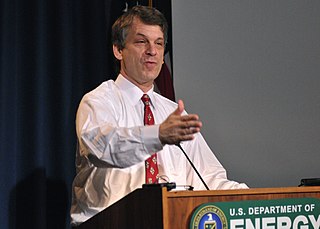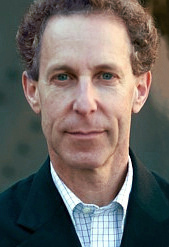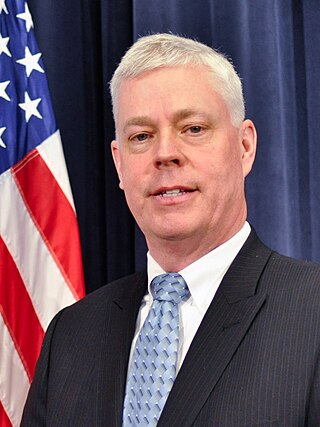
John David Podesta Jr. is an American political consultant who has been serving as Senior Advisor to the President for International Climate Policy since 2024, having previously served as the Senior Advisor to the President for Clean Energy Innovation and Implementation from 2022 to 2024. Podesta previously served as White House chief of staff to President Bill Clinton from 1998 to 2001 and counselor to President Barack Obama from 2014 to 2015. Before that, he served in the Clinton administration as White House staff secretary from 1993 to 1995 and White House deputy chief of staff for operations from 1997 to 1998.

Carol Martha Browner is an American lawyer, environmentalist, and businesswoman, who served as director of the White House Office of Energy and Climate Change Policy in the Obama administration from 2009 to 2011. Browner previously served as Administrator of the Environmental Protection Agency (EPA) during the Clinton administration from 1993 to 2001. She currently works as a Senior Counselor at Albright Stonebridge Group, a global business strategy firm.

Kenneth Lee Salazar is an American lawyer, politician, and diplomat who is the United States ambassador to Mexico. He previously served as the 50th United States Secretary of the Interior in the administration of President Barack Obama from 2009 to 2013. A member of the Democratic Party, he previously was a United States Senator from Colorado from 2005 to 2009. He and Mel Martínez (R-Florida) were the first Hispanic U.S. senators since 1977; they were joined by Bob Menendez in 2006. Prior to his election to the U.S. Senate, he served as Attorney General of Colorado from 1999 to 2005.
The Cape Wind Project was a proposed offshore wind energy project on Horseshoe Shoal in Nantucket Sound off Cape Cod, Massachusetts. It was projected to generate 1,500 gigawatt hours of electricity a year at a first-dollar cost of $2.6 billion.

David Sandalow is the Inaugural Fellow at the Center on Global Energy Policy (CGEP) and Co-Director of the Energy and Environment Concentration at the School of International and Public Affairs at Columbia University. He is the lead author, most recently, of the Artificial Intelligence for Climate Change Mitigation Roadmap and Guide to Chinese Climate Policy.

The Robert and Renée Belfer Center for Science and International Affairs, also known as the Belfer Center, is a research center located at the Harvard Kennedy School at Harvard University in Cambridge, Massachusetts, in the United States.

Gregory Bestor Craig is an American lawyer and former White House Counsel under President Barack Obama, from 2009 to 2010. A former attorney at the Washington, D.C. law firm of Williams & Connolly, Craig has represented numerous high-profile clients. Prior to becoming White House Counsel, he served as assistant to the President and special counsel in the White House of President Bill Clinton, where he directed the team defending Clinton against impeachment. Craig also served as a senior advisor to Senator Edward Kennedy and to Secretary of State Madeleine Albright.

William Y. Brown is a zoologist and attorney, currently the chief environmental officer of the Bureau of Ocean Energy Management in the Department of the Interior. He is a former nonresident senior fellow at the Brookings Institution, a former science advisor to U.S. Secretary of the Interior Bruce Babbitt, a former president of the Bishop Museum in Hawaii, a former president of the Academy of Natural Sciences in Philadelphia, Pennsylvania, and a former president of the Woods Hole Research Center in Falmouth, Massachusetts. He is the author of the novels "Valley of the Scorpion" and "Ruffner's Cave".

Climate change in Massachusetts affects both urban and rural environments, including forestry, fisheries, agriculture, and coastal development. The Northeast is projected to warm faster than global average temperatures; by 2035, the Northeast is "projected to be more than 3.6°F (2°C) warmer on average than during the preindustrial era."

David J. Hayes is an American attorney and legal scholar who serves in the Biden Administration as Special Assistant to the President for Climate Policy. Hayes has led White House work on clean energy deployment issues, climate resilience and greenhouse gas emission reduction and carbon sequestration initiatives. Hayes also has assisted in developing and implementing the climate-related provisions included in the Infrastructure Investment and Jobs Act and the Inflation Reduction Act.

Brian Christopher Deese is an American economic and political advisor who was the 13th director of the National Economic Council, serving under President Joe Biden.
The Massachusetts Executive Office of Energy and Environmental Affairs (EOEEA) is a Cabinet-level agency under the Governor of Massachusetts. EOEEA is responsible for promoting efficient energy use throughout the Commonwealth while protecting and preserving Massachusetts' natural environment.

The U.S. state of Massachusetts has vast wind energy resources offshore, as well as significant resources onshore. The 2016 update to the states's Clean Energy and Climate Plan had a goal of reducing 1990 baseline greenhouse gas emissions levels by 25% by 2020. Current goals include installing 3,500 megawatts (MW) of offshore wind power in the state by 2035. However, as of Q4 2021 the state had only 120 MW of wind powered electricity generating capacity, responsible for generating 0.9% of in-state electricity production. The state has awarded contracts to two offshore projects, the 800 MW Vineyard Wind project and 804 MW Mayflower Wind project. Construction began on the Vineyard Wind 1 project on November 18, 2021, after a long fight for approval. Commonwealth Wind was selected for development in 2021, but the developer has attempted to cancel the project due to increased costs. There are eight projects planned for off the southern coast of Massachusetts, though some will deliver power to Rhode Island, Connecticut, and New York.

Dan William Reicher is an American lawyer who was U.S. Assistant Secretary of Energy for Energy Efficiency and Renewable Energy at the U.S. Department of Energy (DOE) in the Clinton Administration. Reicher is currently executive director of the Steyer-Taylor Center for Energy Policy and Finance at Stanford University, a joint center of the Stanford Graduate School of Business and Stanford Law School, where he also holds faculty positions. Reicher joined Stanford in 2011 from Google, where he served since 2007 as Director of Climate Change and Energy Initiatives for the company's venture Google.org.
Gertrude M. "Trudy" Coxe is an American non-profit executive and CEO of the Preservation Society of Newport County, formerly the Secretary of Environmental Affairs in the Commonwealth of Massachusetts. She has advocated against the construction of offshore wind farms in Rhode Island, arguing that they cause "unnecessary loss to our community's irreplaceable character and sense of place."

Richard K. "Rick" Sullivan, Jr. is an American politician who served as chief of staff to Governor Deval Patrick from 2014 to 2015. Before assuming the office, Sullivan was the former secretary of energy and environmental affairs of the Commonwealth of Massachusetts and former mayor of Westfield, Massachusetts.

Regina McCarthy is an American air quality expert who served as the first White House national climate advisor from 2021 to 2022. She previously served as the thirteenth Administrator of the Environmental Protection Agency from 2013 to 2017.

The Foreign Affairs Policy Board is an advisory board that provides independent advice and opinion to the secretary of state, the deputy secretary of state, and the director of policy planning on matters concerning U.S. foreign policy. The board reviews and assesses global threats and opportunities, trends that implicate core national security interests, tools and capacities of the civilian foreign affairs agencies, and priorities and strategic frameworks for U.S. foreign policy. The board meets in a plenary session several times a year at the U.S. Department of State in the Harry S. Truman Building.

The Madeleine Korbel Albright Institute for Global Affairs is an international studies institute based at Wellesley College in Massachusetts. The Albright Institute was established by former United States Secretary of State and Wellesley College alumna Madeleine Albright in 2009 to support the interdisciplinary study of global issues within a liberal arts framework.

















